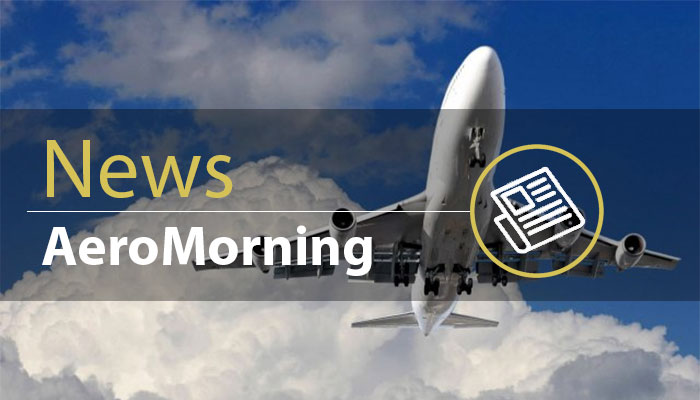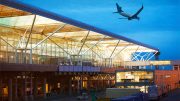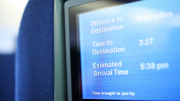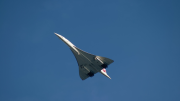Component supply and global logistics company Artemis Aerospace is celebrating twenty-five years of providing innovative and effective component solutions. In this article, Artemis’s joint founders Jim and Deborah Scott, Managing Director and Finance Director respectively, reminisce on their time in the industry and how their ‘spare room’ business became the success it is today.
Tell us about how the business started. Whose idea was it?
Jim: I’d worked in aviation since the late 1980s, at an aviation consultancy and also for an aircraft spares company. In 1999, Deborah and I were newly married with a baby, and I thought it was about time we got on with life in our own way. I saw the opportunity to kick off our own business and see what we could make of it! There have been all sorts of twists and turns along the way; we’ve done some things well and some things not so well, made life complicated for ourselves at times, but here we are and I’m very proud of what we’ve achieved. It was a risk, and people said to us “What will you do if it doesn’t work out?”. I just said if that happens, I’ll go and work for someone else! I remember my accountant at the time subtly trying to put me off the idea, saying I didn’t have enough experience, but fortunately we ignored him and went ahead anyway – and we still use the same accountant!
Deborah: On our very first date, Jim said to me he was going to start his own business one day. He kept saying this year after year, and one day I said “just go ahead and do it! I don’t care what you call it, just do it! I’ll back you the whole way, let me know when you’re going to start.” Well, it took him a week! He told me he was going to set up a company called Artemis Aerospace, and when I asked him why Artemis, he said that she was the Greek goddess of the moon and the hunt. I liked it, so that’s how it started.
What was the Artemis set up to begin with?
Jim: We needed something to sell initially, so we made a very small investment in some components from an airline source in the UK, and we started off as a trading entity. In those days, the aircraft spares business was all about trading, it wasn’t so much about service. That investment kickstarted Artemis and gave us the foundations to move on. We worked from a spare bedroom in our rented house, with a computer and of course a fax machine! If we went on holiday, I’d have to forward my faxes to a friend and call them to see what had come in overnight. So very simple beginnings – when we look at the kind of technology and capability we have in terms of communication now, it’s just light years ahead of where we were in 1999. I actually remember the very first call we ever received as a business. It was my mother-in-law phoning for a chat with Deborah!
Deborah: We had a rental property at the time, in the middle of nowhere, and a young baby, Kitty, but luckily we had a big spare room, so that was where we set up our computer. Kitty was with us every day. We have an old photo of her perched on Jim’s shoulder while he worked! As the business grew, Kitty ended up going to a childminder because we needed more time to concentrate on it. We had nothing to sell, and we started off by investing in a small package of components, which only a week later returned a profit, so we were rolling right from the start. My background is in advertising and marketing, but selling a service is a very different thing to selling a product; luckily Jim had contacts from his previous company roles, and he worked so hard at convincing people to give us a chance. Once they realised we wouldn’t go to sleep at night until the part they needed was delivered, they started coming back to us. We were really selling ourselves as facilitators.
We’re so lucky to have loyal customers. In the first year we had two main customers who came to us over and over again, and they’re still our customers 25 years on, so we must be doing something right! Good customer service is the most important thing, and that loyalty is the proof that we’re doing it the right way.
How big is the team at Artemis?
Jim: There are now 14 of us. We’re not a huge team, but we’ve grown a lot over the last couple of years since the return of the aviation industry post-pandemic. We’re currently growing at something like 40 – 45% year on year. To start with it was just Deborah and me. It wasn’t long before we needed to make a move to offices. We needed storage space as well, so we moved to purpose-built offices and warehousing local to us, and then moved again eight years ago to where we are now at Spithandle Barn.
What made you feel you could provide a better service than your competitors?
Jim: Service and commitment were the only things we could offer at the outset, and we have really tried to maintain the level of both. We feel we’re only as good as the last time we had a successful outcome for a customer, and this industry throws up all kinds of issues on a daily basis. Communication is key, keeping in touch constantly, growing trust and becoming part of a customer’s team so we work in partnership rather than just being a supplier. At the centre of everything we do is an aircraft component, but managing the issues, and the logistics involved in its supply, is crucial.
There are a lot of businesses in this industry, but not all of them are focused on the customer service. We always make every possible effort to find our customers the solution they’re looking for and give them the reassurance that we will do it, which is why we say, ‘we will always find a way!’.
Deborah often says to me I take things too personally, and if something goes wrong I certainly do. Our approach is to give our very best on every single occasion, to look at all the options, give a realistic solution and then deliver that solution. There’s constant pressure to maintain that level of excellence and make sure we’re at the forefront of the industry. Ultimately, we really care about what we’re doing, and I hope that shows in terms of our commitment to our customers.
Deborah: I suppose I thought at the time that my marketing background would revolutionise the industry! Of course it didn’t, but it did revolutionise Artemis. I was always trying to find a marketing angle, whereas Jim was always trying to find components to sell, so the combination of these two approaches made us stand out. We have very different strengths, and we’ve never tried to do each other’s job – we’ve always been at opposite ends of the office, or of the spare bedroom! We trust each other and know we never have to check up on each other’s work.
What have been some of the more challenging moments over the last 25 years?
Jim: Every day throws up a new challenge! There have been all kinds of circumstances when things have been difficult and we’ve been up against almost impossible deadlines, but the main thing is we never overpromise. We’re entirely realistic about what we can achieve for our customers and follow everything through right to the end. Moving components at speed all around the planet creates issues with customs and cross-border transactions; we maximise the use of all kinds of different transport services, whether by air, sea, rail, road, whatever, but most things are subject to the same constraints and we like to think we can overcome whatever obstacles are thrown at us.
We had one issue in the early days where we’d quoted for what was for us at the time a huge sale of several hundred thousand dollars of components and within that package as a sale we needed to purchase some specific components at a great price. The whole deal was going to fall or fly on that basis, and not having the financial power to secure them straight off, we held back a bit and by the time we were ready to buy them the components had gone which was horrendously stressful. At the time we thought it was an incredibly fast-moving market but it’s nothing in comparison to the speed at which it works these days!
I also remember moving into our first office just a few days before 9/11 happened and global aviation just fell flat. It was still early days for us, so the phone wasn’t ringing all the time like it does now, but it didn’t ring at all for weeks or months as life gradually picked up in the industry. One thing we’ve learned in 25 years is that this industry will always be subject to economic cycles, pandemics, wars – it’s a matter of finding your way through these things.
The credit crunch in 2008 was certainly another difficult time, but at the time we were a smaller entity and not so broadly exposed globally. I recall in 2008 we had already started to carve a niche in supporting aircraft leasing companies, and there were a number of projects in 2008-9 which took us to another level in terms of what we were doing and laid the foundations of where we are now and what we do for that sector.
The pandemic was obviously a huge issue for aviation, and if we’d known things were going to return as strongly as they have, we would have worried less about the slump, but it made a massive impact at the time; it was extraordinary to see blue skies completely empty of aircraft. However, we galvanised ourselves and the industry is getting back to full recovery now and looking to the future. Artemis is certainly a bigger, stronger business than it was before.
Deborah: There have been a lot of challenging moments over the last 25 years, beginning, as Jim says, with the obvious ones like 9/11 and the financial crisis of 2008, but by far the most challenging time for me personally was the COVID-19 pandemic. We were a small business, we were owed a lot of money, and I had to get that money in to shore up our cash reserves, to ensure that our business was in a great place to restart even though we didn’t know when that would be – a year later, four years later? No-one knew anything, and of course we had staff who suddenly looked to us for help, and for whom we wanted to do the best that we possibly could.
We had to learn about the furlough scheme – who to furlough, who to keep on . . . it was so difficult. We had some staff furloughed for twelve months and that’s not good for them. So, it wasn’t just about bringing our income and our customer base back, it was getting our wonderful staff back too. We didn’t lose any of them during that time, and I’m proud of that, but it was very stressful! If only we could have seen a year into the future, and know we were going to be OK, we could have enjoyed a summer off, but the worry of making it all right for everyone was a big challenge. As the business owners we felt a huge responsibility for everyone’s wellbeing.
We did set up a table tennis league though – our eldest daughter was finishing university and our youngest was finishing a year at business and media college. They’d gone out into the world and were becoming independent, and all of a sudden they were back home with us. We live right next to the office, which of course was empty, so it was their idea to set up the table tennis table in there. They were on it pretty much all the time.
What’s been the most unusual job you’ve had to do?
Jim: I think probably some of the most interesting and unusual work we’ve done has been in the support of private aircraft, not only the supply of components but interior décor such as furnishings and even artwork, which were just as important to the customer and still required logistics to transport them.
Deborah: That’s an interesting question, because as the business grows, and you grow with it, what seemed unusual 25 years ago can now seem standard practice! Going back to COVID again, my job took a few new turns. Suddenly it wasn’t about the finances, it became about HR as well, and recruitment, and staff retention which is incredibly important to us. We’ve had our core team for over ten years; we’ve seen some of them grow up, get married, start families, move house . . . so my role isn’t just about looking at the bank balance every day. It’s about nurturing the team, something which, 25 years ago, I never thought I could do, or be any good at – at least hopefully I’m good at it!
What’s your favourite thing about working at Artemis?
Jim: I get a huge sense of achievement when things go well – it’s almost worth going through the often very considerable stress and endless difficulties to get there. The relief when that happens, and the customer is happy – I love that.
Deborah: I take a lot of satisfaction in our success; it’s so rewarding after the hard work of every single member of our team. I love coming in in the morning and seeing the familiar faces in the office – although of course I love seeing new faces as well!
What’s been your proudest moment at Artemis?
Deborah: It’s really hard to pick out one specific moment. I’m proud of it all! I think my parents would be proud of the way I’ve taken on the financial role in the business, because as a teenager I was always dreadful with money – I had debts on my credit card and spent all my money on my social life! I never thought I’d end up with this career, so I suppose the way I have managed to adapt to suit the needs of our business is something I’m quite proud of.
Have you got a favourite aircraft?
Jim: From an industry point of view, Boeing 747 jumbo jets have always played a huge part in our history, not that too many of them are in operation anymore. It’s certainly the classic aircraft. Every aircraft we’ve supported over the years has had its interesting points, and we’ve met all of them, right up to today’s Boeing 787 and Airbus A350, the latest and greatest wide body aircraft. We love working with these.
Deborah: I don’t have a favourite aircraft – just the one that’s going to take me somewhere hot and sunny . . .
Do you remember your first time on an aircraft?
Jim: I think most of us remember the first aircraft we ever flew in, going on holiday, and for me that would probably be a BAC 11. I think I sat on a seat facing backwards.
Deborah: We went on a family holiday in the seventies when I was about four or five. We went to Majorca, and I can remember feeling terrified of take-off and landing – I probably enjoyed the middle bit! Since then, obviously I’ve been on many aircraft and now I think it’s the best part of the trip!
What is your most requested component part?
Jim: Quite often it’s the dullest item you can think of, but it’s still one of the most valuable and the aircraft won’t function without it. For aircraft maintenance, the supply of a 50-cent seal or washer can be just as important to make the aircraft serviceable as a $100,000 computer or a hydraulic pump or whatever. I couldn’t even hazard a guess at the sheer number of individual items we’ve supplied over the years – it’s just vast!
Where do you see Artemis going in the future?
Jim: Deborah reminds me far too regularly that I’m pushing 60 now. We’ve been at this for 25 years and we’ve got to the point with the business where it’s a well-regarded entity and we’ve developed significantly over the last few years. I’d like to see us stay on that trajectory and for Artemis Aerospace to maintain a reputation for what we see as the core of our business; total customer care and constant focus. I hope we continue to grow. It would be great to think we will be here in another 25 years – let’s see!
Deborah: I hope Artemis will carry on doing as well as it’s doing now, ultimately, I suppose I want it to eventually continue without us as we have a fantastic team. Not that we’re thinking of retiring any time soon! But I love the thought that what we have started and nurtured will continue to grow and prosper for other people.
Are there any particularly funny moments you remember from the last 25 years?
Jim: There are all sorts of things I couldn’t possibly tell you about! I do remember we set off an escape slide in the yard here, but no-one had quite worked out which way the slide would unleash itself – we caught the moment on video, and it wasn’t funny at the time, but my reaction on camera was quite amusing . . .
Deborah: They probably involve staff who don’t work here anymore! Naming no names, of course, we did have a new member of staff turning up drunk on her first day! Needless to say, she didn’t last the morning. We do laugh a lot at work which is very important. One of the funniest moments was working here one long hot summer and a massive grass snake, or possibly even an adder, slithered its way through the open front door. A colleague was in the loo and when she came out, she saw this huge snake on the floor; she screamed and ran back into the loo, locked the door and refused to come out. Meanwhile we rescued the snake and took it outside (I think someone had to climb through a side window), but it took a lot of persuading to get my colleague to come out of the loo . . .
Who’s been the most influential person in your career?
Jim: No question – definitely Deborah! Without Deborah this business wouldn’t have existed. I wanted to start a business, and had the skills to do it, but without her guidance and help I’d never have managed it. Everything that Deborah brings to the business has been absolutely critical. I know she never saw herself as having anything to do with finance, yet she’s run the finances for Artemis from the start, and her role has become so broad and so important that Artemis wouldn’t be here, as we are today, without her.
Deborah: Prior to starting Artemis, I’d always worked for women bosses, and when I worked for a marketing department at a bank there was a lady called Sharon who was an absolute dynamo. She found me in the post room in tears one day because I was meant to be in a marketing job, and all I was doing was sticking credit cards into envelopes and sending them off. She took me out of the post room, sat me at her desk and said “right, we’re going to teach you about marketing properly.” She was a huge influence on me. Eventually she sent me to work for another formidable lady called Angela Milan and I worked with her in advertising in London for about ten years. Oh, and Margaret Thatcher of course!
What would be the worst thing your business could be compared to?
Jim: We’re not pushy sales people. That would be worst of all. I think many years ago people looked on aircraft spares dealers as a bit beneath them, making fortunes – a beer and skittles sort of life. That’s very far from the truth, though, it’s a hugely competitive market and always has been, extremely risky in terms of the value of components. But we’re definitely not a sales team. We find solutions.
Deborah: As Jim says, we’re not the type of business which sets sales targets. We do have sales people, but we call them account managers and we hire them for their excellent customer service skills. They’re there to deliver a service, deliver solutions to our customers, and that’s how we want to be perceived.
If you hadn’t set up Artemis, what would be your dream job?
Jim: You mean if I had the capabilities? Where do I start? I never wanted to be a premiership footballer, that’s for sure. I certainly didn’t have the skills, and I’m too old now! I’ve got a strong interest in the past and I wouldn’t mind being an archaeologist, or something like that. It probably wouldn’t pay the bills though. I love music, and anyone who’s seen me dance can see I’ve got natural rhythm . . . or possibly not! I’d have been very happy being a drummer in a rock band, but no-one asked me. Oh, and maybe a racing driver in my spare time.
Deborah: I suppose I always thought my career would be more glamorous, more involved in travel, perhaps Formula 1, but it didn’t happen like that!
What was the first record you ever bought?
Deborah: This is quite embarrassing, but I was so into them at the time – it was a Haircut 100 single. The second one I bought, Donna Summer’s I Feel Love, was the one I was most obsessed with.
Jim: I think it was ‘Don’t Stop Me Now’ by Queen.
Do you have a favourite meal?
Jim: It’s a bit dull, but probably steak and chips. Standard chap things. Chicken curry, that sort of thing. I do love food, but it often gets to about 4pm and someone asks if I’ve had lunch, and I realise I haven’t! Beer or wine? Both please, but in the right order.
Deborah: Something that’s been cooked for me, and if it’s been cooked with love then I’ll enjoy it. I’m quite into vegan food at the moment, although unfortunately Jim isn’t! I’m not even a vegetarian, but I just like that fresh, modern type of cuisine.
What one item could you not do without?
Jim: My glasses. I’m lost without them these days, like a lot of us, sadly it’s just the way it is!
Deborah: Probably my hair straighteners – I don’t suit the frizzy hair I was born with, so I’ve always straightened my hair. I’m not happy unless it’s smooth!
What three things would you take to a desert island?
Jim: It would have to be my glasses to start with! I’d also need something to write things down with and something to write them on. Pen and paper. I can’t remember anything without writing it down.
Deborah: I’d definitely need face cream and sun cream to stop me getting wizened! A good book, and probably a bottle of wine, and then I could pretend I was on holiday . . .
Tell us about Artemis’s amazing location.
Deborah: Our office is in rather a beautiful part of the West Sussex countryside. Jim and I spent a lot of our family life in rented accommodation because we were waiting for that special property to come on the market which we knew we could make our real home, and have our horses, and have room for our business there too. Twelve years ago, Spithandle Barn came onto the market. It took us a while to secure it, but we’re very happy here, our staff are happy here, and our children grew up here too. We have forty acres, with stunning views over the South Downs.
We’re down a quiet country lane which can throw up a few challenges when we’re expecting a big delivery – we’ve had a few lorries getting stuck, but they’ve always managed to escape eventually. We’ve got lovely neighbours; only a few because we are very rural, but everyone is supportive which is great because I’d hate to feel our business was intrusive in the countryside. We’re very aware how privileged we are to be working from such a wonderful place. Actually, everyone in this lane is running a business – there’s a nursery opposite, and a cattery – it’s clearly a good place for it!
Celebrating 25 years in the aviation industry this year, Artemis Aerospace provides component supply and repair, the management of surplus aircraft parts, global logistics, flight simulator and lessor support. Contact Artemis to find out how your business can benefit from the team’s expert service.









Be the first to comment on "Artemis Aerospace celebrates 25 years of flying high"